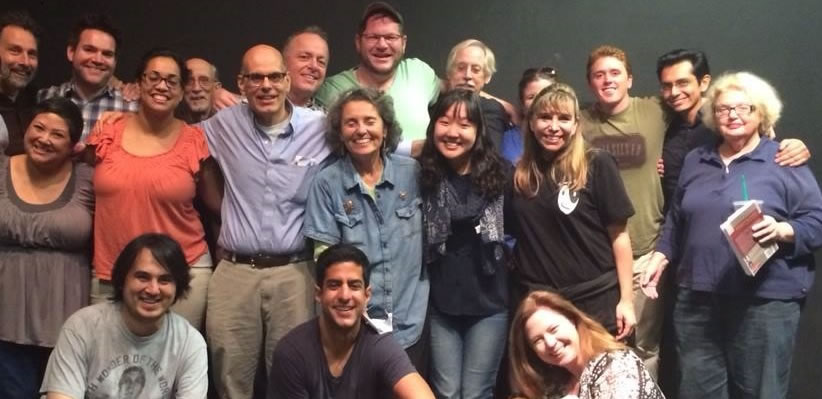How Improv Workshops Can Help a Corporation Improve

Years ago when I first started teaching corporate improv workshops, other improvisers would give me crap saying I was selling out. Wow, have times changed. Today, corporate improv workshops are more popular than ever. And guess what? I still love teaching them, because I believe the concepts of improv are not just great on stage, but they can be truly life-changing philosophies as well.
Recently, I was interviewed by Jody Michael and Associates, a career coaching and organizational coaching company, about how to use improv to improve leadership skills. But of course, improv can help improve lots of other aspects of a corporation, as well.
If you’re in the corporate world and you’ve heard about improv workshops, you might be interested in knowing exactly how your company could benefit from one. Here’s what I think are the biggest benefits that corporations can get out of hosting an improv workshop:
1. Building trust
Too often in companies, people have work together, but because of office politics, personality conflicts and meetings behind closed doors, there is often not a lot of trust among co-workers. Just think how much more productive, and yes, profitable, companies would be if there were more trust in their organization.
When I teach corporate improv workshops, I build trust through play, which is a hard concept for some result-oriented people in corporate America to understand. I structure my corporate workshop with games and exercises that are solely designed with having fun in mind.
Giving the participants permission to be silly and to laugh without worrying about what they’re supposed to be learning is the secret ingredient in building trust. The sure sign that this is being accomplished is when their laughter fills the room. Laughter is the by-product of building trust.
2. Listening
I cannot tell you how many times some big, Type-A sales rep will come up to me before a corporate workshop and say, "I am a great listener. I don't need help on listening." Then we play an improv game and he won't shut up, or worse, he tries to control how he thinks the game is supposed to go.
Listening is an attitude. It’s about letting go of control and responding and building off the last thing that was said by your partner. We all need to work on listening, including me, the guy teaching the workshop. It’s muscle, a skill that needs to be developed. I have very rarely meet someone who is a natural listener.
In improv, we learn that real listening comes when we suspend judgement and have the courage to throw away the script in our head. Instead of rehearsing to yourself in your head what you're going to say as your boss drones on and on about something, instead you can learn to truly listen in the moment and react to the last thing that was said.
3. Yes, and…
Once a corporation works on building trust and teaching people how to listen, then they’re ready to learn the improv concept of “Yes, and…,” which means that they can take an idea that someone else has offered and build off of it. In the fear-based culture of some companies, the thought of saying “Yes, and…” to Larry's idea about payroll and adding something to it, instead of shutting him down, is revolutionary. This is a powerful tool that can change the culture of a company and can generate ideas and solutions beyond everyone’s imagination.
Instead of thinking about ways that every idea won’t work, employees are encouraged to find ways to be supportive of one another. If employees learned to say “Yes, and...” 40 percent more often after taking an improv workshop, just think what that could do to change a company’s culture and productivity. Nothing makes me happier than when I hear from a client after a workshop who says, “Hey, we used that “Yes, and…” concept in a brain-storming session recently and it really worked.”
4. You can learn about your organization through improv
What I am the most proud of in my improv training is that through the games and exercises I teach, corporations can identify bigger issues in their organization that need to be talked about and open up discussions about them that lead to solutions.
I have seen high-level managers admit in improv workshops that they take on too much responsibility because they didn’t trust their team, or sales reps who catch themselves telling people what to do in improv game because that’s how they think they should lead. One time, a CEO who had organized a training showed up late to it and the rest of the group felt uncomfortable about proceeding without him, which turned out to be a great gift he gave that workshop. In the right hands, improv workshops have the power to correct some of these issues hidden in an organization that get in the way of the company being the best it can be.


Great points here! An improv class would be a great way to help employees learn teamwork and about each other. Thanks for sharing this!